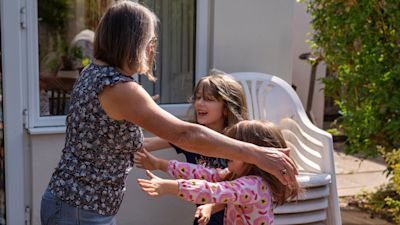Support bubbles: How many people make up a linked household? What about childcare? Your questions answered

A new lockdown across England means people must stay home unless for specific reasons.
However, 'support bubbles' will remain in place - but what are the rules?
What is a support bubble?
A support bubble is a close support network between a single adult household and one other household of any size. For instance, a two-parent family can create a support bubble with a grandparent who lives on their own.
Can I stay overnight with the person that makes up my social bubble?
Yes - support bubbles are the equivalent of members of your own household.
Therefore, individuals making up support bubbles will not have to observe social distancing rules such as staying two-metres apart.
And it means that social bubbles can interact indoors and overnight stays are permitted.
Can I change who is in my social bubble?
No - once you make a support bubble, you should not change who is in it.
Can two social bubbles meet up in the park?
At the moment, no.
The new rules mean that people can leave for recreational purposes with their own household or social bubble, or on their own with one person from another household (a “one plus one” rule).
However, health minister Nadine Dorries has said children under school age who are with their parents will not count towards the limit on two people meeting outside.
Do children count in a social bubble?
No - it depends on the number of adults living there rather than children. Single adults living alone or single parents whose children are under 18 can join another household.
The second household can be of any size and can even be another single-parent household.
What about if I live with a carer? Can I still see my grandchildren?
Unfortunately, support bubbles can only be made with one single-adult household that is not part of a bubble with anyone else.
This means if both grandparents are alive and living together, or if one of them lives with a carer, they can only form a bubble with a single-adult household.
For instance, if their daughter lives alone with their grandchildren, a bubble can be formed. If their daughter is married or lives with a partner or another adult, this is outside of the bubble rules.
Downing Street has acknowledged not everyone will benefit from the change although officials have hinted a further loosening of the rules when the coronavirus outbreak declines.
What about vulnerable people who are shielding?
Support bubbles can now include people who were previously shielding.
What about single people or couples who live apart?
Two single people living alone can form a bubble. Therefore couples who live apart can still see each other and stay overnight.
However, if a single person in a house-share forms a bubble, his or her housemates would not be allowed to form their own bubbles.
Do I have to form a bubble with my ex so I can see my children?
No - if you're a single-adult household, you can form a support bubble with another household and still have access to your children.
Likewise, if you are not a single adult household, you can form a support bubble with a single adult household other than the one that include's your child's other parent.
Children can move between the homes of their parents if their parents are separated.
What are childcare bubbles?
These are slightly different and involve nurseries or childminders.
Childminders and nurseries will stay open and childcare bubbles, where for example a grandparent provides childcare while a parent works, will be able to continue.
Is there any limit on the distance between households in a bubble?
No - although officials are suggesting people should try to "stay local" where possible to help prevent the virus spreading between areas.
However you can't bubble with anyone in Scotland, Wales or Northern Ireland, as these social bubbles only apply to England.
What happens if someone in a bubble develops coronavirus symptoms?
The person with symptoms must stay indoors for seven days and all others within the support bubble need to quarantine for 14 days.
People with shared child custody should ensure that members of both bubbles quarantine if someone develops symptoms.